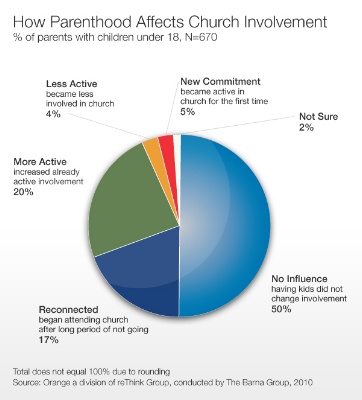News Editor
Senior Member

Joined: 04/17/2006
Online Status: Offline
Posts: 3575
|
|
Posted: 05/24/2010 at 8:15am
|
IP Logged
|

|
|
 Study Examines Link Between Having Children and Churchgoing Study Examines Link Between Having Children and Churchgoing
The Barna Group
VENTURA, CA - How does having a child change a parents’ level of church involvement? This question was explored in a new research study, conducted by the Barna Group in partnership with the Orange, a division of the reThink Group. The nationwide study conducted among nearly 700 parents of children under the age of 18 asked respondents to describe how having children affected their connection to a church or faith community.
KEY FINDINGS
· No influence. The largest share of parents (50%) reported that having children did not influence their connection to a church. This perspective was most common among parents in the Northeast and West as well as among college graduates. Among atheists and agnostics, nine out of 10 said that becoming a parent had no influence on their connection to a faith community. The same was true among nearly seven out of 10 adults associated with a faith other than Christianity. However, among parents who are Christian, a notably smaller share (47%) said that the presence of children was unrelated to their church life.
· Reconnected. About one-sixth of parents (17%) said that having a child helped them reconnect with church after a long period of not attending. Lower income homes were more likely than average to offer this assessment. Hispanic parents were also likely to describe their parenting path in this way.
· More active. Another one-fifth of parents (20%) said they were already active but become more involved. Political conservatives and Republicans were among the parents most likely to describe an increased level of church activity after becoming parents.
· Less active. Overall, 4% of parents said that having children actually decreased their involvement with a church. This was most common among parents who are single and never married as well as Asians.
· New commitment. Parenthood rarely sparks brand-new experiences of faith for people: only one out of every 20 parents (5%) said that having children helped them become active in a church for the first time. Midwest parents were among the most likely to express this view, as were Catholics and Hispanics.
 MATTERS OF AGE MATTERS OF AGE
It appears difficult to teach older parents new tricks. Younger parents (those under the age of 35) were more likely than average to say parenthood had helped them reconnect to church after a period of not attending. In contrast, older parents (those over the age of 35) were least likely to indicate that their church life had been influenced by the arrival of children.
Similarly, parents with children under the age of five were more likely than average to say that they reconnected with church after a long period of not attending, while parents of teens were likely to say that having children had no impact on them.
One of the surprises from the research is that fathers and mothers described the influence of becoming a parent in virtually identical fashion.
FAITH DIFFERENCES
The parents’ description of their faith played a role in perceptions of parenting impact. Parents who are theologically defined as evangelical were among the least likely to have changed their church patterns as a result of becoming a parent. Two out of three evangelicals said that parenthood made no difference to their church involvement, presumably because a majority was already actively involved in a faith community before welcoming offspring into the world and they remained active with their children.
The church habits of unchurched parents were less likely than those of churched parents to be affected by having children (60%), but even many churched parents (41%) said that having children did not change their level of church engagement.
Attenders of large churches were more likely than were those attending smaller congregations to increase their level of church involvement, perhaps suggesting that larger churches are more attentive to the needs of families.
WHAT IT MEANS
David Kinnaman, president of the Barna Group, directed the research and clarified a common assumption about families. “Many religious workers assume that parenthood motivates people to return to their spiritual traditions and to church attendance. This perspective is especially common when it comes to justifying the frequent disengagement among young adults. Sometimes faith leaders go so far as to simply wait for parenthood to occur, when they figure the ‘real work’ of ministry can begin.
The survey calls that strategy into question. Children do, in fact, act as a catalyst for millions of parents. Yet, this is not the most common or normative experience for parents in the nation. While parenthood can reset people’s priorities in life, having children is not an automatic faith-starter for most adults. It’s more complicated than that. Family background and their personal faith history impact their behavior.
Kinnaman pointed out the importance of influencing young lives. “Parenthood might help to clarify and enhance people’s pursuit of spirituality, but usually it does not fundamentally alter a parent’s spiritual trajectory. Getting people to transition from church involvement based upon religious inertia to activity driven by a sense of engagement is exceedingly difficult – and relatively rare. Compounding the challenge, the age of parenthood is being pushed back as more young women delay having children into their late twenties and beyond. If the objective is to incorporate young parents into congregational life, it is important to help shape young people’s beliefs attitudes, habits and aspirations long before they become parents.”
More …
Source: Barna.org
© 2010 The Barna Group
Edited by News Editor on 05/24/2010 at 8:26am
|
